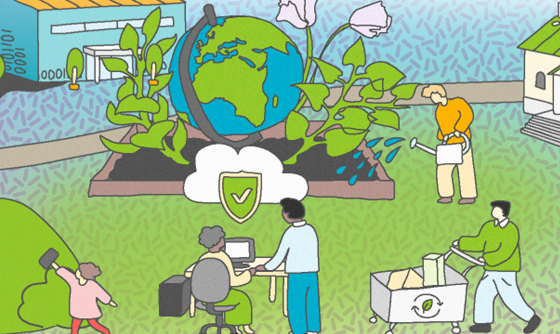“Although the technology sector currently produces a great deal of greenhouse gas emissions, its handprint is much larger than its footprint,” says Green ICT Project Manager Antti Sipilä of the Finnish Information Society Development Centre (TIEKE).
This means that even though it creates a high environmental burden, the sector also has many positive effects on other sectors. In future, companies will have to report on the greenhouse gas emissions impact of information and communications technology (ICT).
“Emissions from the technology sector are growing so fast that a rapid response is needed. At the same time, electronic waste is the fastest-accumulating type of waste in the world,” says Sipilä.
According to Sipilä, emissions from the technology sector in 2020 were around 4 per cent of global emissions, but in 2025 the share is forecast to be as high as 12 per cent. In other words, things are worsening fast. However, in Sipilä’s view there would be little sense in limiting the growth of the ICT sector, since its handprint and impact on the economy is so large.
Mandatory emissions reporting through a new EU directive
With the introduction of the EU’s Corporate Sustainability Reporting Directive (CSRD), regulatory requirements relating to technology are changing rapidly. The directive requires companies to report more extensively on greenhouse gas emissions from technology. It will lead to more stringent emission reductions requirements and lower emissions.
“This is where even large companies can fall by the wayside, because the requirements are coming into force very soon and must be met,” Sipilä says.
Large companies will have to report their 2024 emissions in 2025. This tight schedule applies to companies that meet two of the following conditions: net turnover of €40 million, a balance sheet of €20 million, or at least 250 employees. The emissions impacts of listed companies must be assessed in their sustainability reports by 2026.
Toxic waste, limited raw materials
As noted, the ICT sector today generates a massive amount of waste, and the waste is toxic. The environmental burden of the sector also depends on the amount of energy used.
“Although it’s often said that Finnish server rooms are powered with wind-generated electricity, the amount of it is limited. If server rooms use up the lion’s share of wind power, electricity generated from fossil fuels will be used elsewhere,” Sipilä says.
Despite the growing amount of waste, technology also has positive effects, Sipilä adds.
“Due to the intangible nature of what it produces, the ICT sector enables economic growth without increasing the use of raw materials that are in limited supply. The sector has developed at a tremendous pace, and future technological innovations will contribute to solving the environmental problems caused by the sector.”
Sipilä points out that electrical appliances can and should be recycled, as the amount of virgin raw materials in the world is limited. Moreover, the rising prices of virgin materials also lead to economic benefits through increased pressure for recycling. The concepts of soft and hard recycling are used in the sector.
Soft recycling involves the recycling of equipment and components, such as network cards, that do not have a limited life. Hard recycling involves the recycling of the raw materials in electronic devices, preferably those that are as far as possible easily recyclable, such as aluminium.
The balance between the ICT sector’s footprint and handprint is not a simple matter. Sipilä cites the example of collectible Pokémon figures, which used to be made of plastic but can now be collected electronically with a smart device. Naturally, plastic is no longer needed.
“Sustainability in the IT sector has been addressed fairly vaguely. In the tech sector everything must be measurable, such as the number of devices used, the number of cloud services, the amount of waste heat generated by server rooms, and the lifetime of equipment. This provides an opportunity to work together for the good of the environment and to produce the sustainability reports required by the EU.”
A future leader in green ICT?
Established in 2022, the Green ICT ecosystem is a nationwide network of organisations promoting sustainable ICT development and the circular economy to combat the effects of climate change and biodiversity loss. The Green ICT ecosystem will also improve the competitiveness of the Finnish ICT sector in several ways – environmentally, economically and socially.
The initiative has its roots in the Green ICT project for supporting software companies and public procurers in the Uusimaa region. The project was funded for the 2021–2023 period by the Recovery Assistance for Cohesion and the Territories of Europe fund (REACT-EU), coordinated by the Helsinki-Uusimaa Regional Council. In addition to the sustainability network, an open Green ICT information portal was developed in a project jointly undertaken by TIEKE, the information and communications technology association TIVIA and LUT University.
The ecosystem expanded to Central Finland through the Green ICT for Manufacturing Industry SMEs project, and with the Green Metrics for Public Digitalization Acquisitions (MitViDi) project it expanded to Southwest Finland and South Karelia. Green ICT Visiiri project is currently underway, expanding the ecosystem to the national level.
“Finland has huge potential to become a leader in green ICT,” Sipilä says. “We have created criteria for the ecosystem that have also attracted international interest.”
The programs, guides and other materials produced by the projects have been compiled in an open Green ICT portal, which serves companies in their transition towards more environmentally friendly technologies.
Green technology within easy reach: programs and materials in the Green ICT portal
- The Green ICT portal gives organisations the means to adopt more environmentally friendly technology.
- The portal includes guides, webinars, articles and various software.
- The development plan program uses a battery of questions to help organisations identify what they could do to promote eco-friendly technology in their organisation.
- MitViDi helps procurers to take the climate into account in software procurement.
- The Green ICT portfolio for manufacturing companies helps manufacturing industries to make their ICT-enabled operations eco-friendlier. The portfolio has been created in the Green ICT for Manufacturing Industry SMEs project for Central Finland.
- The portal and materials are available in Finnish at https://greenict.fi
Collaborate with TIEKE?
Want to help organizations in sustainability or themes such as digital competence, data economy, or real-time economy? Partner with us!
TIEKE Finnish Information Society Development Centre is a non-profit organisation founded in 1981 aiming to develop, improve and support a thriving information society and all its digital endeavours.
We help organizations in various ways:
- Projects and initiatives
- Networking and ecosystem work
- Surveys and studies
- Expert services and advice
- Webinars, online trainings and coaching programmes
- Materials and guides
We have a track record working in various project roles: coordination, partner, expert, comms and more.
We run around 15 projects per year and are familiar with instruments such as CERV, Erasmus, ERDF and ESF.
We work with wide array of target groups such as SMEs, large companies, educational organizations, public sector and associations.
Don’t hesitate to get in touch to discuss collaboration opportunities with us!










